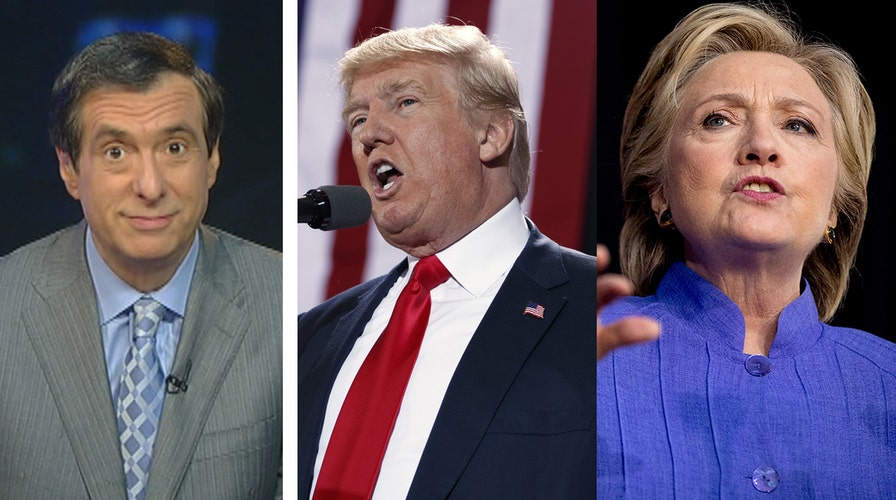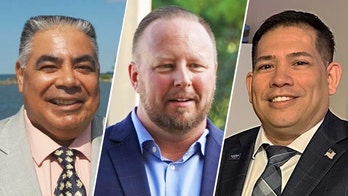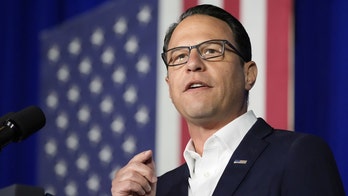Kurtz: Why the campaign is giving us whiplash
'MediaBuzz' host Howard Kurtz weighs in on how all the headlines in this crazy campaign are making it hard to keep up
This has turned into the whiplash election, and it’s virtually impossible to keep up with the head-snapping revelations.
Even the most diligent journalist can get vertigo trying to investigate and evaluate each disclosure, which damages Hillary Clinton or Donald Trump and spawns dire predictions that their campaign is toast, only to fade in a news cycle or two.
Some developments that in a “normal” election would badly wound a presidential candidate get meager exposure in the rest of the media because they are overshadowed by other mega-stories. No one has the bandwidth to do it all.
This is more than a mere campaign; its craziness has become the beating heart of American culture, debated in every cubicle and coffee shop and at every level of the increasingly toxic stew of social media.
Just look at the last few weeks:
Democrats and many members of the media have taken up weapons and stormed a place called Comey Island.
The FBI director shook up the race by revealing a probe of emails that wound up on the laptop of a top aide’s estranged husband under investigation for sending illicit messages to an underage girl.
The New York Times reported that Trump avoided hundreds of millions of dollars in income taxes through a loophole scheme so dubious his own lawyers advised him that the IRS could declare it improper.
The Clinton campaign got advance questions before CNN town halls from a top Democratic Party official who was also a paid contributor at the network, which booted her.
The Washington Post reported that Donald Trump has repeatedly “sought credit for charity he had not given — or had claimed other people’s giving as his own.”
Back on Comey Island, the FBI chief was reported to have argued that the administration shouldn’t accuse Russia of using cyberwarfare to interfere with the presidential campaign because—yes--it would look partisan so close to the election.
Hacked emails revealed that the daughter of the Democratic nominee’s husband, himself a former president, complained that his aides were cashing in on the Clinton Foundation and siphoning money from her parents.
The Trump Foundation was ordered to stop fundraising by the New York attorney general, a Democrat and Clinton supporter.
Clinton’s top advisers, reeling after the email scandal broke, complained that said she had terrible instincts and a pathological aversion to apologizing, according to hacked emails.
Back on Comey Island, the FBI looked into whether Trump’s company had a secret email server communicating with a Russian bank but found no direct link.
A Clinton aide complained in a hacked email that “we…speak in such a tortured, nuanced way when we don’t get any advantage from the nuance, and just wind up looking political.”
Back on Comey Island, the FBI opened a preliminary investigation of Trump’s former campaign manager and his ties to Russian interests, which Paul Manafort said he knew nothing about.
Trump boasted a decade ago on a Hollywood entertainment show that as a celebrity he could grab women by the genitals, which he now dismisses as locker-room talk.
Back on Comey Island, FBI agents were investigating financial and ethical issues at the Clinton Foundation but were told to stand down by top law-enforcement officials, according to the Wall Street Journal.
Eleven women accused Trump of sexually propositioning them or unwanted kissing or touching, all of which he denounced as lies.
Trump held a news conference before a debate with Paula Jones and Kathleen Willey, who have accused Bill Clinton of sexual misconduct, and Juanita Broaddrick, who has accused him of rape, which he has denied.
Hillary Clinton nearly collapsed while getting into a car and belatedly revealed that she had pneumonia.
And, well, I could go on.
Many of these cases prompted media firestorms, complete with predictions that Trump or Clinton would be seriously or even fatally damaged. But then the stories were overtaken by some new allegation or outrage.
In the case of Comey’s renewed email investigation, polls so far suggest that it hasn’t moved the needle much beyond the tightening that was already taking place in the race.
It may well be that we’ve all become numb in this whiplash campaign. The race is so polarized, and public attitudes toward Trump and Clinton so firmly established, that each new front-page headline or cable obsession changes few minds.
Perhaps the only consensus is a sense of relief that this long, strange trip is finally coming to an end.





